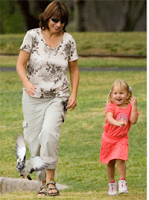Domestic Violence is not acceptable in any community. We need to address all issues, not only attend to and support the victim’s but also work with the perpetrators to change their offending behaviours. This problem needs a holistic approach otherwise the cycle of violence will continue. We need more programs for men to assist them in change. If we want change we need to change our methods and to work with both parties, obviously what we have been doing in the past has not worked so we need to find programs that do work and support these. As they say if we keep doing the same thing we get the same results. The Enough is Enough Anti-Violence Movement runs programs for men who want to change and women who want to change their circumstances.
No excuse for violence, says Aboriginal leader
By Adele Horin
November 23, 2005
The indigenous leader and ALP vice-president, Warren Mundine, has rebuked Aboriginal men for the horrific level of domestic violence in many communities.
He said bashing women was not part of traditional Aboriginal culture, and he was tired of the excuses men made for their behaviour, including blaming alcohol, and problems at home.
"I'm tired of hearing Aboriginal men say they bashed their wife because white fellows took our country," he said yesterday. "Now that really [teaches] the white fellows a lesson."
Mr Mundine is one of dozens of prominent men to be appointed "ambassadors" by UNIFEM, the UN development fund for women, in a campaign to eliminate violence against women. Culminating in White Ribbon Day on Friday, the campaign has featured controversial TV advertising, and is part of the biggest effort by men across the world, in partnership with women, to end domestic violence. Speaking at an event attended by the rugby league players Benji Marshall, Dene Halatau, and Robbie Farrah, Mr Mundine called on Aboriginal men to "stand up and make a difference".
He said he was part of a community where the statistics for domestic violence were "the worst of the worst", with women in some Queensland Aboriginal communities at 24 times the average risk of being raped.
A recent survey of 6600 women by the Australian Institute of Criminology found 10 per cent of Australian women had experienced male physical or sexual violence the previous year, and almost 60 per cent had experienced it over their life-time. A study last year by VicHealth found that for women younger than 45, violence contributed more to their poor health and death than factors such as smoking and obesity.
Mr Mundine said part of the problem was that violence towards women appeared to be acceptable.
Referring to a barbeque he attended in Dubbo a few years ago, he said: "I was talking to some men about domestic violence and what really shocked me was they could suck a beer and eat a sausage sandwich and talk about slapping their wives and girlfriends around as if they were talking about the weather."
Women were the backbone of Aboriginal families, he said, and the communities would suffer if the women were "kicked in the guts day after day".
Another "ambassador," the Catholic Archbishop of Sydney, George Pell, said he had been shocked by statistics that showed reported rates of domestic assault had increased by 50 per cent in NSW over seven years.
Irfan Yusuf, a lawyer and columnist for the Australian Islamic Review, called on imans to cease lecturing "models on what sort of dress they should wear" and instead lecture men on how they should treat women. Terry Melvin, manager of Mensline Australia, a telephone counselling service, said 10 per cent of calls were about violence. Many men identified themselves as perpetrators, concerned about their behaviour.
"It's great to raise community awareness," he said of the Federal government's $20 million 'Australia Says No' media campaign. "But you need comprehensive behaviour change programs on the ground."
This article runs true to my way of thinking. Many times when talking of my experiences, others I speak to have had the same ordeals, which is really sad. I don’t want our next generation experiencing the same.
The movie ‘Once Were Warriors’ was a brilliant movie and actually showed the reality of the more violent Domestic Violence incidents. What others viewed as horrific and unrealistic was something that myself and many of my fellow people witnessed on many occasions, and suffered both as a victim and the child of a victim.
I remember putting the pillow over my head at night and singing to myself to drown out the sound of my Mum being bashed. I tell my Mum’s story now along with my own not to get sympathy as a victim. To thrive on being resilient and lifting myself from that situation and following a positive journey to thrive on helping others. Has enhanced both my own life and the lives of those around me.
by Kimi Alcott, EIE Cultural Coordinator









